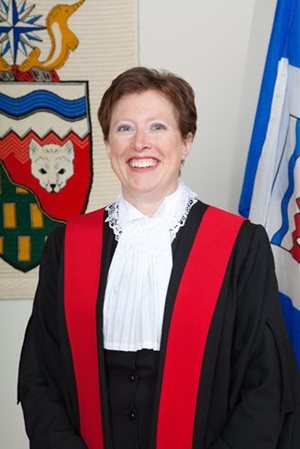The Honourable Christine Gagnon
 What was your path into law and onto the bench?
What was your path into law and onto the bench?
Growing up, I had many experiences where I stood up against unfairness. I did not know where this came from, it was something I just had to do. Although I had this natural propensity for justice, I did not go straight to Law School upon graduating from CEGEP in Quebec. I experimented with different programs and work, to gain life experience, and also to be sure that this was what I wanted to do.
The most important decision I made in my life was to change it altogether after thirteen years of legal practice in Quebec, and to leave everything behind to embrace life in Nunavut, where I moved with my spouse and two children to take on the position of Crown prosecutor. In Nunavut, I learned about a proud and resilient people, and about a ruggedly beautiful, yet unforgiving, land. I learned that I knew nothing about life, and I learned to open my mind. In all, I spent twenty years in the Arctic, between Nunavut and the Northwest Territories, and twelve of those years were spent as a judge of the Territorial Court of the Northwest Territories. I knew I wanted to be a judge when I started to analyze how judges behaved, and beginning to think about what I could bring to this function. I also knew that because of the knowledge I had acquired about the North, this was the only place where being a judge made sense for me.
What experience in your legal career best prepared you for work on the bench?
All the mistakes I made contributed to making me the judge that I am today. My patience on the bench is driven by the knowledge that despite our best intentions, human errors happen and it serves no purpose to rub someone’s nose into it. I have seen young lawyers be crushed by one misguided comment made by a judge, and I have vowed to make my courtroom a place where lawyers focus on doing their job the best way possible, rather than on how the judge will view their performance.
I was always impressed by how the late Claire Barrette-Joncas, then Coordinating Justice of the Quebec Superior Court, treated counsel in her court. She was always polite, and she never criticized counsel. Rather, through skillful questions, she led counsel where she wanted them to go, and she encouraged them to argue their point rather than shutting them down. She always found a constructive way to get counsel to give the best of themselves.
What advice do you have for counsel who appear before you?
I would like to share a life-changing experience that happened to me as a prosecutor. I was meeting with a witness prior to a jury trial. I knew that this witness had cognitive challenges, and I expected that she would be given a hard time in cross-examination, so I had arranged to have regular meetings with her. One afternoon, she looked at me, and she said: “Can we just talk?” So she talked and I listened. She told me about her life, about growing up in Nunavut, about the abuse that she suffered as a child. We did not talk about the facts of the case, but as I listened to her, I was able to understand her thought process, and more importantly, her references. Through this process, she learned to trust me, and I learned how to communicate with her beyond the barriers of culture and language. What I learned from this woman was the importance of listening with an open mind.
What do you wish the public knew about the justice system?
I think that I would like to public to know more about how justice is delivered in all three Territories. There are great initiatives being put forward by the territorial governments, in partnership with community organisations, with a view of offering alternatives to the over-incarceration of indigenous persons, by focusing on what brings them to be in conflict with the law.
I would also like the public to know that there are places in Canada that are only accessible by air, and that high quality justice is delivered in remote locations, sitting in gymnasiums, and community centers.
While judges must maintain their independence and impartiality, they may inspire others to develop innovative approaches to conflict resolution by spearheading committees and steering committees. The late Beverly Browne, when she was the Chief Judge of the Nunavut Court of Justice, was such a person. She understood the importance of community empowerment, and she was behind such projects as the Rankin Inlet Spousal Abuse Program, and the Akitsiraq Law School. In addition, she made sure that her court was accessible to all by providing simultaneous interpretation of every court session held in the communities.